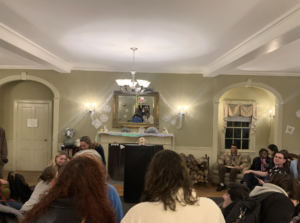“Midnights” Album Review

No artist in the last two decades has been as prolific as Taylor Swift. Since the pandemic alone, she has released six full length albums, one of which houses 30 tracks alone. Love her or not, you’ve got to respect her. Throughout her 17-year career and 12 studio albums, she has written every song she has ever released. Her collaborators are consistent; Jack Antonoff has been at her right hand side as a producer and friend for the last decade working on some of her greatest hits. Most recently, he produced the 10 minute version of “All Too Well”, Swift’s all time fan favorite song.
Swift’s re-record of her iconic 2012 album, Red, was released last November, filled with 30 songs new and old, in an effort to regain ownership of her masters. Swift had signed a record deal at 15 years old with Big Machine and when her contract was up, her entire discography was sold without her permission. Since signing with Republic Records in 2017, Swift owns the rights to all of her future masters, including Lover, Folklore, and Evermore. When Swift announced a new studio album titled Midnights not even a year later, fans were not surprised, but most definitely ecstatic.
Swift’s promo leading up to the release was goofy, in her charmingly Millennial ways. She created a Tik Tok series called “Midnights Mayhem With Me”, where each day she announced a track title at random. In usual Swift fashion, her aesthetic and personal style has shifted and adapted to this new era, consisting of warm tones and a 70s wardrobe. Swift notably didn’t release a lead single leading up to the new record, making fans wait and savor the release more readily.
At midnight on October 21st, Midnights came out, and quickly rose to #1 on every streaming platform. It became the biggest debut day of any record in Spotify history. The record followed through on Swift’s eternal promise: to be something entirely new and surprising. The album was set to house 13 songs, and three hours after its release, Swift jump-scared her fans dropping an additional seven songs at 3am. The twenty-track record is a stand-out for Swift, embracing a more raw and introspective life inside her 30s. Her vocal range reaches new heights in this album and she employs more key changes than ever before.
The record opens with “Lavender Haze” a synth-pop anthem where Swift proclaims, “I’m damned if I do give a damn what the people say.” “Vigilante Shit” is a bit of an eye-roll, a track hellbent on revenge. Swift aims higher with “Karma” an equally petty but more fun and catchy look at vengeance. In “Anti-Hero”, Swift lists her worst nightmares, most spearheaded by her life in the limelight, describing a scenario in which her children spend her funeral fighting over her will. Instead of looking outward, she blames herself, admitting, “It’s me, I’m the problem.” Later in the track, she asks, “Did you hear my covert narcissism I disguise as altruism?”
Her highly anticipated collaboration with Lana Del Rey, “Snow On The Beach,” ended up featuring very little Lana (she did backup vocals throughout), leaving fans wanting more. “You’re On Your Own Kid” is a stellar ballad, as Swift sings to herself growing up, first as a young child, and then in her early twenties as her life crumpled. She references her great escape from the spotlight in 2016, singing, “The jokes weren’t funny, I took the money; my friends from home don’t know what to say.” She writes about that period often throughout the album, when she and her partner, Joe Alwyn, ran away to England for two years, hiding from the media. Swift reflects on the normalcy of her life these days that she and Alwyn have worked for for the past six years. In her lullaby “Sweet Nothing,” Swift paints a simple picture, “You’re in the kitchen hummin’, all that you ever wanted from me was sweet nothings.” From this record it’s clear, Swift is happy, but she’s worked hard to get there. She’s still madly in love on Midnights– on “Labyrinth” Swift declares, “I’ll be getting over you my whole life.”
The stand-out song on Midnights is hands down “Would’ve, Could’ve, Should’ve,” a track that looks back on a painful relationship at 19 years old (inferably John Mayer). At 32 years old, Swift reevaluates the pairing, telling him to, “Give me back my girlhood, it was mine first.” She asks herself why she can’t let it go: “If clarity’s in death, why won’t this die?”, and in one of the best Swift bridges of her entire discography, Swift admits, “God rest my soul, I miss who I used to be/ The tomb won’t close, stained glass windows in my mind/ I regret you all the time.” The song is a culmination of all of Swift’s personal growth, and a terrifying realization of being taken advantage of too young.
In “Mastermind”, the 13th song on Midnights (anyone who knows anything about Swift knows her relationship with that number), Swift battles herself as a mastermind. She plots the start of her relationship, imagining herself as a Machiavellian all-knowing character holding all the cards. By the end of the track, in a Phantom Thread twist, she realizes her lover “knew the entire time, you knew that I’m a mastermind,” Swift sings. It’s a beautifully self-aware moment where all the games end. In a time where she lost all control over her public image, her partner letting her believe she was the mastermind gave her exactly what she needed. In the end, they both win. Remembering her childhood, Swift professes, “No one wanted to play with me as a little kid, so I’ve been scheming like a criminal ever since to make them love me and make it seem effortless/ This is the first time I’ve felt the need to confess.” It’s one of Swift’s most honest moments, and brings her listeners closer to her than ever.
Rolling Stone magazine has been the most important and relevant reviewer throughout Swift’s career, and immediately gave Midnights an instant “classic” rating, with an astounding 5/5 star review. Rob Sheffield, staff writer and long time admirer of Swift writes, “Taylor was already in the realm of the all-time great pop auteurs before she turned 25, but she never rests on her laurels — she barrels forward like she doesn’t notice the laurels are even there.”
Swift has been competing with herself for the last decade. On Midnights, she fights her inner demons in search for quietude. Still, in Swift-ian fashion, she can’t help herself from cursing out her adversaries. In a turn of events, Midnights shows Swift as an antagonist and explores her insecurities in a darker, riper way than she has before. Self-admittedly forever young, Swift embraces growing up on Midnights and her music matures with her.





Be First to Comment